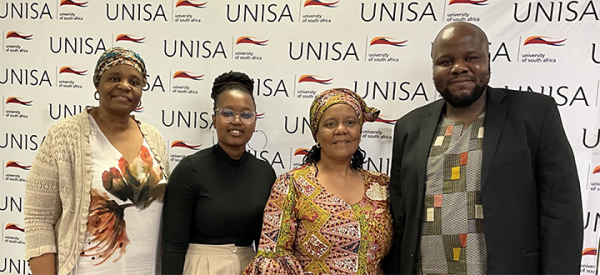News & Media
Redefining human rights during President Trump's administration
During her welcoming remarks at Unisa’s Human Rights Day Seminar, Prof Grace Khunou, Acting Executive Director of the Department of Leadership and Transformation (DLT), pointed out the importance of universities and academics engaging positively with the decisions made by United States President Donald Trump’s administration.

Prof Grace Khunou (Acting Executive Director: Department of Leadership and Transformation), Dr Julia Simango (Lecturer: Department of Psychology), Dr Musawenkosi Malabela (Researcher: NEHAWU) and Dr Masentle Lengane (Director: Systems and Policies)
On 19 March 2025, a seminar entitled Human rights in the Trump era: Reflections on the challenges of resource dependency was hosted at Unisa’s Oliver Tambo Building.
Khunou stated, "The theme for today gives us an opportunity to reflect on independence of African states and Trump’s decisions which propels the continuity of colonialism". She encouraged the audience to consider opportunities in areas under America’s control.
The aim of the seminar was to discuss the global and African impacts of President Trump’s second term.
Continuity of colonialism
Khunou stated that Trump’s actions and decisions within his first 50 days in office reflected the continuation of colonialism. She explained: "The year that he was voted into power, President Trump championed the slogan 'Make America Great Again' which social scientists interpreted as 'make America white again'." Khunou added, "We also see how he makes decisions that not only impact South Africa but countries such as Canada who are as influential as America". She discussed America’s economic control over other states and noted that "interdependencies among states has deeper consequences on equality, and human rights".
Dr Julia Simango, an academic in the Department of Psychology, shared her thoughts on America, particularly in relation to South Africa, during her presentation titled What would Fanon say? Trump(ing) humanity. Her discussion focused on the understanding of whiteness and white supremacy, specifically the ontology and metaphysics of whiteness. She challenged the audience to reflect on white people, especially in the postcolonial era. "We also should think about where Trump and other white supremacists are right now," she said.
In her presentation on the emancipation journeys of Africans since the 1960s, Simango questioned whether Trump and other white supremacists are weary of the social justice movement. She asked: "Is 60 something odd years enough for white supremacists to decide that they are tired of engaging in what humanity is for other people?" She further enquired: "Are they really tired of hearing people wanting to claim their humanity?"
Safeguarding human rights from Trump
Simango further explained that Afro-pessimist scholars view whiteness as being based on the suffering of others, particularly black people. She emphasised the need to confront Trump’s version of humanity with this perspective, considering the new world order and new forms of whiteness he is promoting. Simango pointed out that issues such as South Africa’s new land policy and the notion that white people are oppressed, must be addressed. To ensure humanity for all, she believes we should adopt new perspectives on humanity through Fanon’s interpretation: "Studying Trump made me realise that he is seeking to evoke new forms of being for white people which is an extension for white metaphysics and ontologies of whiteness that we had known over the years. We need to find an intersection between the humanity of black and white people."
Dr Musawenkosi Malabela, a researcher at the National Education Health and Allied Workers Union (NEHAWU), discussed issues related to resource dependence on healthcare services. He viewed Trump’s decisions as punitive towards Africans and argued that these decisions provided many countries with an opportunity to rethink how aid creates dependence. Malabela reminded the audience that Trump is a democratically elected president, committed to fulfilling his campaign promises. "Trump is actually doing well on delivering on his campaign," Malabela said, citing the immediate halt of funding to the Emergency Plan for AIDS Relief (PEPFAR), and the stop-work order for existing grants and contracts.
Malabela said that Trump’s decision will reverse the progress made in the fight against the human immunodeficiency virus (HIV) and acquired immunodeficiency syndrome (AIDS). "Countries such as Kenya, Lesotho, South Sudan, Burkina Faso and Nigeria are going to run out of antiretroviral therapy," he said. He further explained that it is a major crisis for Africa reinforcing the idea of Trump’s punitive actions. Malabela emphasised that American aid to other countries is used for control and punishment. He added that governments should prioritise and budget for health and education, using aid only as supplementary support. "Our government should take control and provide public goods to stop the circle of dependence on funders," Malabela argued.
The seminar examined the challenges of resource dependence and provided valuable intellectual discussions on humanism, white supremacy, and the future of healthcare and education.
* By Lesego Chiloane, Marketing and Communication Specialist (acting), Unisa Department of Leadership and Transformation
** Photography by Olorato Mogorosi and Lebogang Hlungwane, Interns, Department of Leadership and Transformation
Publish date: 2025/03/31

 Unisa co-hosts G20 community outreach in the Eastern Cape
Unisa co-hosts G20 community outreach in the Eastern Cape
 Unisans gain membership of prestigious science academies
Unisans gain membership of prestigious science academies
 Advocating for disability transformation through servant leadership
Advocating for disability transformation through servant leadership
 Unisa Press continues to illuminate the publishing space
Unisa Press continues to illuminate the publishing space